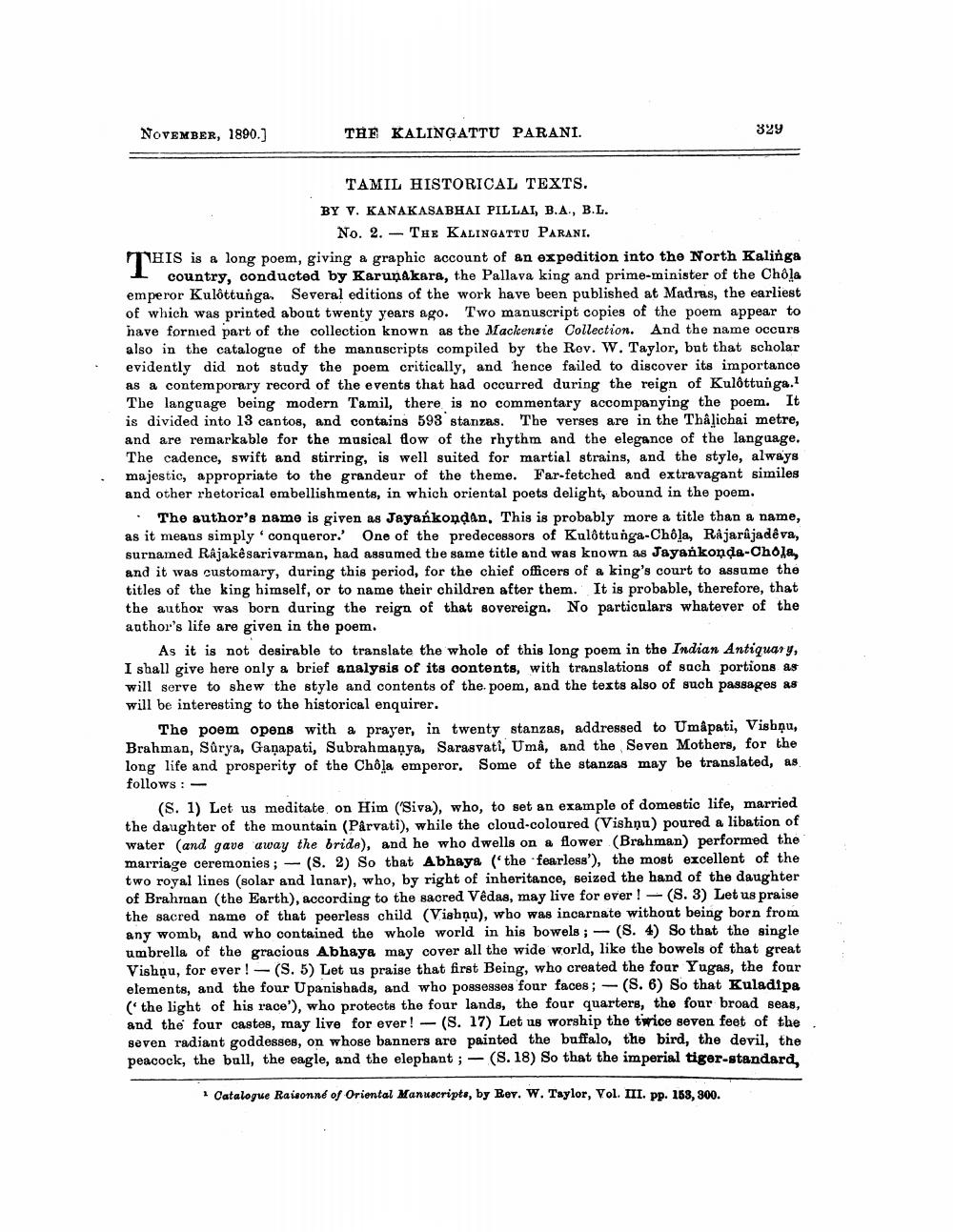________________
NOVEMBER, 1890.)
THE KALINGATTU PARANI.
329
TAMIL HISTORICAL TEXTS. BY V. KANAKASABHAI PILLAI, B.A., B.L.
No. 2.- THE KALINGATTU PARANI. THIS is a long poem, giving a graphic account of an expedition into the North Kalinga
country, conducted by Karunakara, the Pallava king and prime-minister of the Chola emperor Kulôttunga. Several editions of the work have been published at Madras, the earliest of which was printed about twenty years ago. Two manuscript copies of the poem appear to have formed part of the collection known as the Mackenzie Collection. And the name occurs also in the catalogue of the manuscripts compiled by the Rev. W. Taylor, but that scholar evidently did not study the poem critically, and hence failed to discover its importance as a contemporary record of the events that had occurred during the reign of Kulottunga.l The language being modern Tamil, there is no commentary accompanying the poem. It is divided into 13 cantos, and contains 593 stanzas. The verses are in the Thâlichai metre, and are remarkable for the musical flow of the rhythm and the elegance of the language. The cadence, swift and stirring, is well suited for martial strains, and the style, always majestic, appropriate to the grandeur of the theme. Far-fetched and extravagant similes and other rhetorical embellishments, in which oriental poets delight, abound in the poem.
• The author's name is given as Jayańkongan. This is probably more a title than a name, as it means simply conqueror. One of the predecessors of Kulottunga-Chola, Rajarûjadêva, surnamed Rajakesarivarman, had assumed the same title and was known as Jayaňkonda-Chola, and it was customary, during this period, for the chief officers of a king's court to assume the titles of the king himself, or to name their children after them. It is probable, therefore, that the author was born during the reign of that sovereign. No particulars whatever of the author's life are given in the poem.
As it is not desirable to translate the whole of this long poem in the Indian Antiquary, I shall give here only a brief analysis of its contents, with translations of such portions as will serve to shew the style and contents of the poem, and the texts also of such passages as will be interesting to the historical enquirer.
The poem opens with a prayer, in twenty stanzas, addressed to Umâpati, Visbņu, Brahman, Surya, Ganapati, Subrahmanya, Sarasvati, Umâ, and the Seven Mothers, for the long life and prosperity of the Chôla emperor. Some of the stanzas may be translated, as follows:
(S. 1) Let us meditate, on Him ('Siva), who, to set an example of domestic life, married the daughter of the mountain (Pârvati), while the cloud-coloured (Vishnu) poured a libation of water and gave away the bride), and he who dwells on a flower (Brahman) performed the marriage ceremonies; - (S. 2) So that Abhaya ('the fearless"), the most excellent of the two royal lines (solar and lanar), who, by right of inheritance, seized the hand of the daughter of Brahman (the Earth), according to the sacred Vedas, may live for ever! - (S. 3) Let us praise the sacred name of that peerless child (Vishņu), who was incarnate without being born from any womb, and who contained the whole world in his bowels; - (S. 4) So that the single umbrella of the gracious Abhaya may cover all the wide world, like the bowels of that great Vishộu, for ever! - (S. 5) Let us praise that first Being, who created the four Yugas, the four elements, and the four Upanishads, and who possesses four faces; - (S. 6) So that Kuladipa (the light of his race'), who protects the four lands, the four quarters, the four broad seag, and the four castes, may live for ever! - (S. 17) Let us worship the twice seven feet of the seven radiant goddesses, on whose banners are painted the buffalo, the bird, the devil, the peacock, the bull, the eagle, and the elephant ; - (S. 18) So that the imperial tiger-standard,
Catalogue Raisonné of Oriental Manuscripts, by Rev. W. Taylor, Vol. III. PP. 153, 900.




